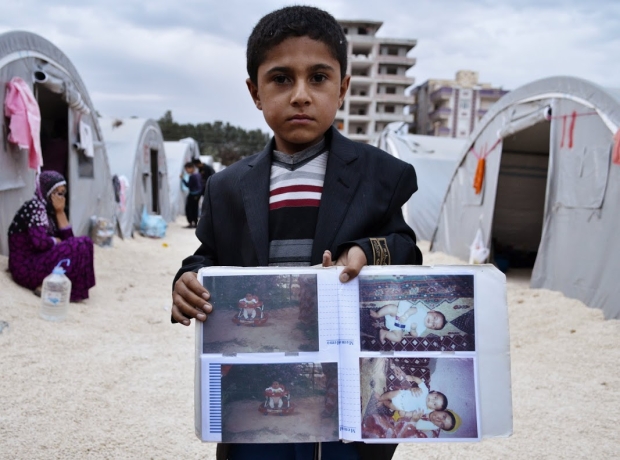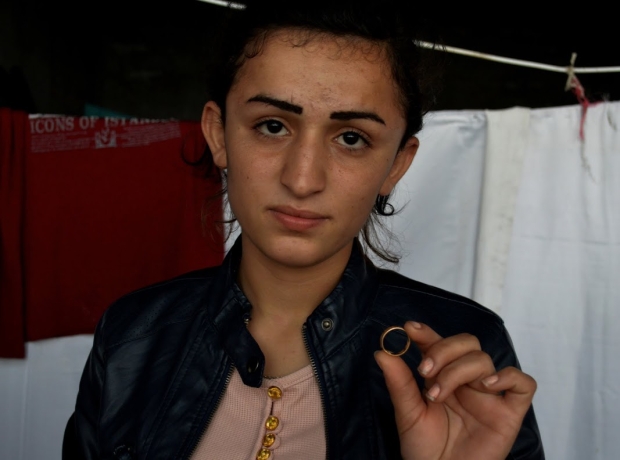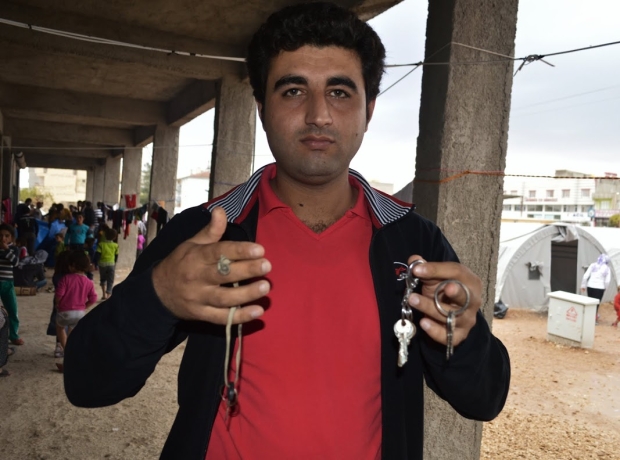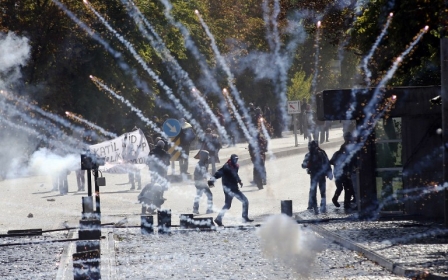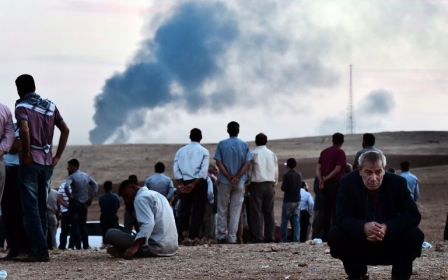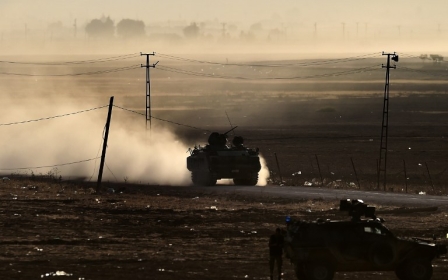Fleeing Kobane: Only the things they could carry
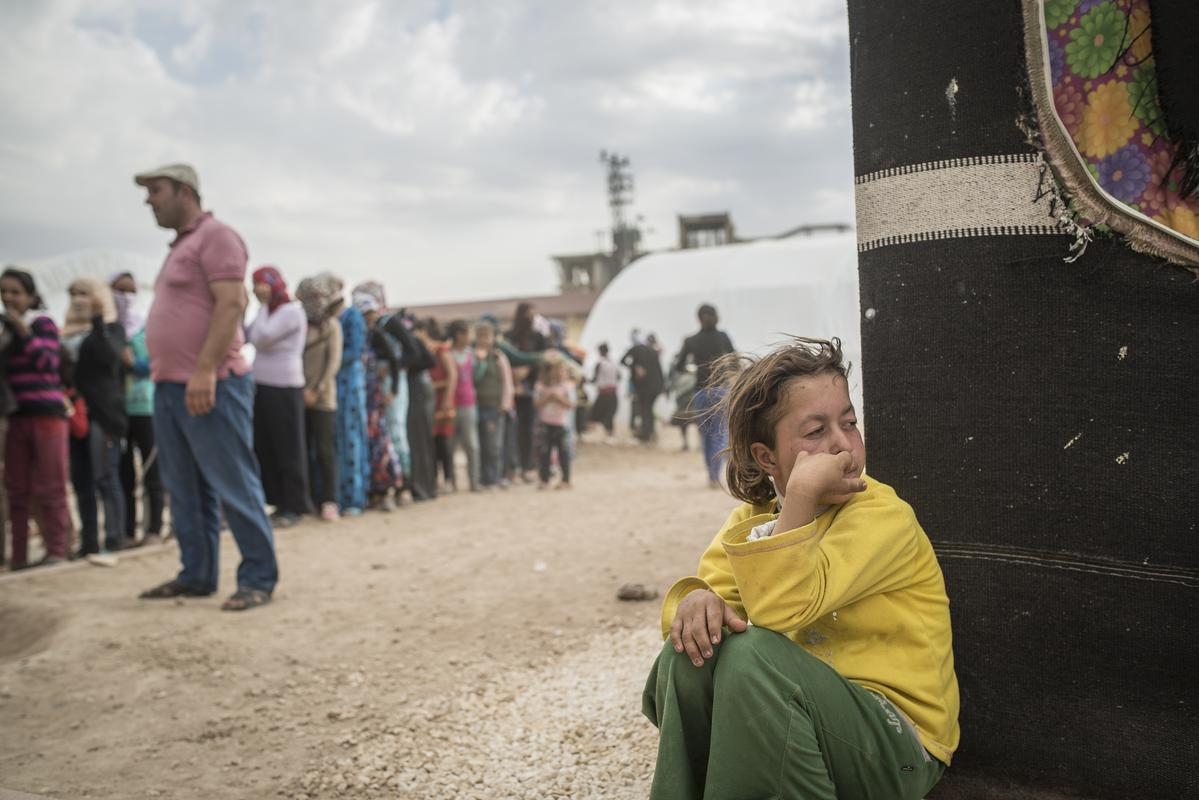
SURUC, Turkey – When Islamic State militants began to close in on Kobane, the town erupted into chaos.
Most fled with just the clothes they were wearing, and any money stashed away in the house they could grab quickly.
Taking the time to pack bags was a gamble, especially for families living on the outskirts of the town, who had long heard about the notoriety of the advancing militants that have captured world attention for the particular brand of cruelty they unleash on their opponents.
Yet, even amid the chaos, a few individuals managed to take an object of sentimental value, an item that in their mind could not be left behind and could not be replaced. In disarray and terror, a small piece of comfort was nonetheless carried over the Syrian border to safety.
Two weeks ago in the middle of the night, as they hurryingly packed their lives into the family’s small battered car, Bisiki ran back inside to grab the deeds to his lands in Kobane. His wife, Maram, quickly followed, grabbing precious family photos.
“We left so fast we couldn’t bring anything with us really, it was all so fast, so you just grab the things you think you can bring with you,” Khaled told Middle East Eye.
“When you remember something is important, it becomes so important. I remembered our land deeds, I want to always have proof that this is my family’s place – to never lose that - and my wife grabbed the family photos.”
Since his arrival in Turkey, Bisiki has kept the land deeds close to him to ensure that he has a constant reminder of his little piece of Kobane – the town he has spent his whole life in. The rest of his family, however, seemingly prefer the photos his wife brought over and they now spend hours huddled together looking through the bag of photographs, reliving old memories from Kobane under the drab grey tarps of their refugee tent.
Family weddings, holiday snaps, and even posed photos with the YPG during the more than three-year-long Syrian war have been saved. Maram Bisiki said she was sure that if the Islamic State made it to her house, they would destroy those memories, along with their home – a prospect that was just too much for her to take.
“We would never lose our photos, they are our memories, they are in our heart but it is nice to be able to look back and see. We will keep these with us anywhere we go,” Maram said as she sifted through a stack of mismatched photographs while Mohammed, her youngest child, watched on, pointing at certain photos with particular interest.
“We aren’t sure where we will end up now, but it’s nice to have something with us, because we have lost everything right now,” Maram added.
Stories like that of the Bisiki’s can be found throughout the refugee encampments in the Turkish border town of Suruc where many families – despite the current hardship – have sought sanctuary and found at least a little bit of comfort by saving a personal belonging that amids the destruction still helps remind them of the home.
In the rush to flee the city, there was only one prized item she felt compelled to bring with her – her engagement ring.
“Wearing the ring is new to me and I didn’t always have it on. When my family said it was time to run we didn’t take much with us, it all happened very quickly, but I ran to my room and grabbed my ring,” Jihan told MEE as she turned the small golden band around her ring finger.
“I may not wear it always but it means so much to me. Since I got here to the camp I haven’t taken it off.”
As the rain lashed down on the small refugee outpost in the middle of Suruc, Isliman appeared happy to ignore the downpour to show off the ring, an item that promised a future that she can still look forward to despite her current predicament.
“We’ve been here a while now, but we think the fight is going well, I think we can be back home in a few days, and then my fiancé is coming back home,” she said. “It has been a really bad few weeks but I believe things can get better.”
“Seven of us live here,” he said, as he motioned to the 10x10 meter area of plastic tarp his family now call home.
Bags of clothing and donated bedding line the walls, taking up much of the small tents internal space.
Halawla managed to get away with all seven of his family members who frantically packed what they could and piled their lives into two small cars, while the sounds of explosions and heavy artillery fired off nearby.
The situation was extremely “hectic” and we had no time to grab anything but the bare necessities, just some clothes and medicine, Ayman explained.
“But I never stopped carrying my keys around,” he told MEE. “It might sound silly, I don’t need them here, but they are a comfort to me I think. As we were about to leave Kobane I checked each one was there, now I continue carrying them here as it reminds me that we will go home.”
Just as Palestinians took their keys when they were forcibly displaced from their homes in 1948 during the creation of the state of Israel, Ayman told MEE that he felt the keys held some symbolism for his family - a promise he could hold onto for the younger members of the family so that they will forever be reminded that they have a home to return to.
Halawla held up each key. “This is to my home, this one is my mother’s home, and this one is the most important to me I think, the key to my shop,” he said. “I walked to my shop everyday, I woke up to open it at 9am – everyday, no matter what.
“We will come back to open our house and our shop again to hold onto our normal life in Kobane and live our life again, I am sure of it.”
New MEE newsletter: Jerusalem Dispatch
Sign up to get the latest insights and analysis on Israel-Palestine, alongside Turkey Unpacked and other MEE newsletters
Middle East Eye delivers independent and unrivalled coverage and analysis of the Middle East, North Africa and beyond. To learn more about republishing this content and the associated fees, please fill out this form. More about MEE can be found here.


